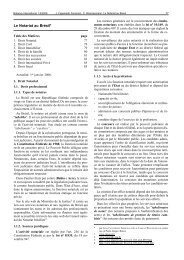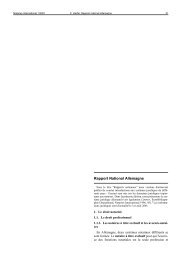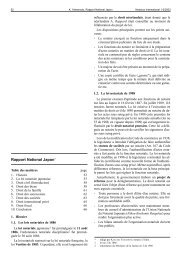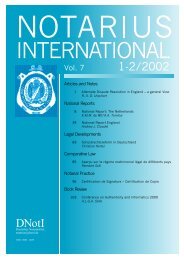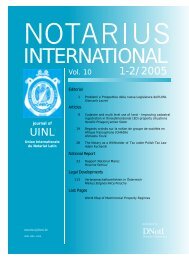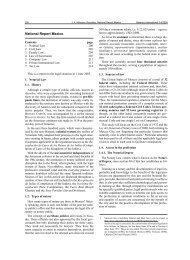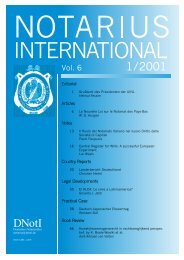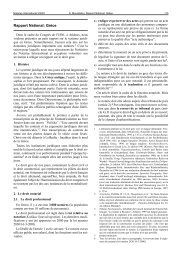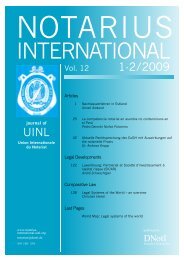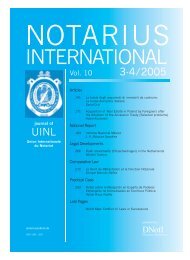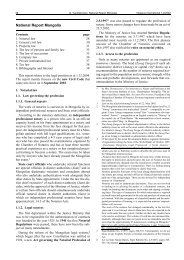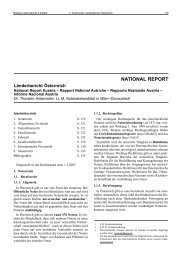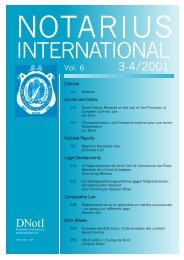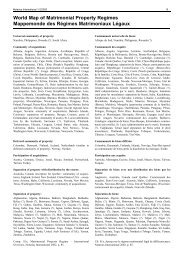ARTICLES and NOTES - Notarius International
ARTICLES and NOTES - Notarius International
ARTICLES and NOTES - Notarius International
Create successful ePaper yourself
Turn your PDF publications into a flip-book with our unique Google optimized e-Paper software.
136 T. Antenreiter, National Report Austria <strong>Notarius</strong> <strong>International</strong> 3-4/2002<br />
trian Notarial Academy (Österreichische Notariatsakademie)<br />
(for the training <strong>and</strong> continuing professional education<br />
of members of the profession).<br />
2. General civil law<br />
2.1. General Civil Code<br />
The General Civil Code (Allgemeines Bürgerliches<br />
Gesetzbuch: ABGB) dates back to the year 1811 <strong>and</strong>, despite<br />
numerous revisions <strong>and</strong> amendments, at its core it<br />
has remained unaltered. Necessary supplementary additions<br />
were partly incorporated into the General Civil<br />
Code itself <strong>and</strong> partly laid down in separate special statutes.<br />
Examples of important supplementary statutes are,<br />
for instance, the Marriage Law (Ehegesetz: EheG), the<br />
Law on L<strong>and</strong>lords <strong>and</strong> Tenants (Mietrechtsgesetz:<br />
MRG), the Law on Ownership of Residential Property<br />
(Wohnungseigentumsgesetz: WEG), the L<strong>and</strong> Registry<br />
Law (Grundbuchsgesetz: GBG) <strong>and</strong> the Consumer Protection<br />
Law (Konsumentenschutzgesetz: KSchG).<br />
2.2. Reform of the law on warranties<br />
The last major amending statute implemented the main<br />
provisions of the EU Directive on the sale of consumer<br />
goods into the General Civil Code itself. The whole area<br />
of warranties was the subject of far-reaching <strong>and</strong> comprehensive<br />
reform on the occasion of the implementation<br />
of the directive. The most important changes in comparison<br />
with the former legal position are the introduction of<br />
a statutory presumption that the item was defective at the<br />
time it was h<strong>and</strong>ed over to the purchaser, reorganisation<br />
of warranty remedies <strong>and</strong> extension of warranty periods<br />
14 .<br />
3. Property law<br />
3.1. Acquisition of title<br />
Austrian law is bound by the principle of “causa”, in<br />
accordance with which an effective transfer of property<br />
must be based on a valid agreement (causa) between the<br />
present owner of a piece of real property <strong>and</strong> the transferee.<br />
In addition to title under the law of obligations, compliance<br />
with a particular procedure is further necessary<br />
for the acquisition of title, which in the case of immovable<br />
property consists of registration in the L<strong>and</strong> Register<br />
15 . Art. 380 of the General Civil Code states unequivocally:<br />
“ownership cannot be attained without title <strong>and</strong><br />
without the legal method of acquiring title”. No special<br />
form has to be observed under Austrian law for the drawing<br />
up of the title under the law of obligations; in particular<br />
it is not necessary for it to be in notarial form.<br />
Nevertheless notaries public play an important role in<br />
relation to property contracts in practice, as Art. 31 of the<br />
L<strong>and</strong> Registry Law stipulates that inclusion in the L<strong>and</strong><br />
Register can only be made on the basis of public documents<br />
or private documents in relation to which the signatures<br />
of the contracting parties have been authenticated<br />
by the courts or by a notary <strong>and</strong> the attestation<br />
clause contains, in the case of natural persons, their date<br />
of birth.<br />
3.2. Sale of real property<br />
In relation to the sale of l<strong>and</strong> <strong>and</strong> residential properties,<br />
Austrian notaries act in many cases in a fiduciary capacity<br />
for the h<strong>and</strong>ling of the purchase price, in particular<br />
where the notary has drawn up the contract himself <strong>and</strong><br />
in cases where there is outside financing in respect of the<br />
purchase price by a bank <strong>and</strong> a registered security (mortgage).<br />
The trusteeship must be registered in the Austrian<br />
Chamber of Notaries’ Trustees Register <strong>and</strong> a separate<br />
trust account opened with the Notary Trust Bank, the<br />
protection of the contracting parties being ensured by the<br />
insurance cover of the Trustees Register.<br />
As additional security for the purchaser, in relation to a<br />
typical purchase contract a ranking notice in respect of<br />
the intended sale is entered in the L<strong>and</strong> Register, which<br />
safeguards the purchaser’s warranted ranking <strong>and</strong> enables<br />
him to have lower ranking entries in the L<strong>and</strong> Register<br />
deleted. The ranking notice in respect of the sale removes<br />
the risk for the purchaser that the property is burdened<br />
or sold to another party between conclusion of the<br />
contract <strong>and</strong> final registration.<br />
The activities of the notary in connection with the selfassessment<br />
of Property Transfer Tax are described in<br />
detail in No. 8.<br />
3.3. Building contract<br />
The Law on Building Contracts 1997 (Bauträgervertragsgesetz:<br />
BTVG) contains special protective measures<br />
for the party acquiring title to property, title to residential<br />
property, a building right, a right of lease or other right of<br />
use <strong>and</strong> enjoyment in buildings, houses or business premises<br />
yet to be erected or being completely renovated 16 . In<br />
particular a building contract must be concluded in writing<br />
<strong>and</strong> must contain certain minimum particulars laid<br />
down by statute 17 .<br />
3.4. Ownership of residential property <strong>and</strong> building<br />
right<br />
Austrian law is characterised by the civil law principle<br />
of “superficies solo cedit”, whereby ownership of a<br />
building depends in principle on ownership of the piece<br />
of l<strong>and</strong>. As an exception to this the Law on Ownership<br />
of Residential Property 2002 (Wohnungseigentumsgesetz:<br />
WEG) laid down the legal prerequisites for establishing<br />
freehold residential property ownership in independent<br />
dwellings or business premises <strong>and</strong> the Law on<br />
Building Rights (Baurechtsgesetz: BauRG) instituted<br />
the insertion of separate building right entries in the L<strong>and</strong><br />
Register.<br />
The new Law on Ownership of Residential Property<br />
2002 only came into force a short time ago <strong>and</strong> its introduction<br />
brought about numerous changes to the former<br />
legal position. In particular, along with a natural (individual)<br />
person or legal entity, the owner can now also<br />
14 Arts. 922 to 933b ABGB (General Civil Code)<br />
15 Art. 431 ABGB (General Civil Code)<br />
16 Art. 2 Law on Building Contracts<br />
17 Arts. 3 <strong>and</strong> 4 Law on Building Contracts



